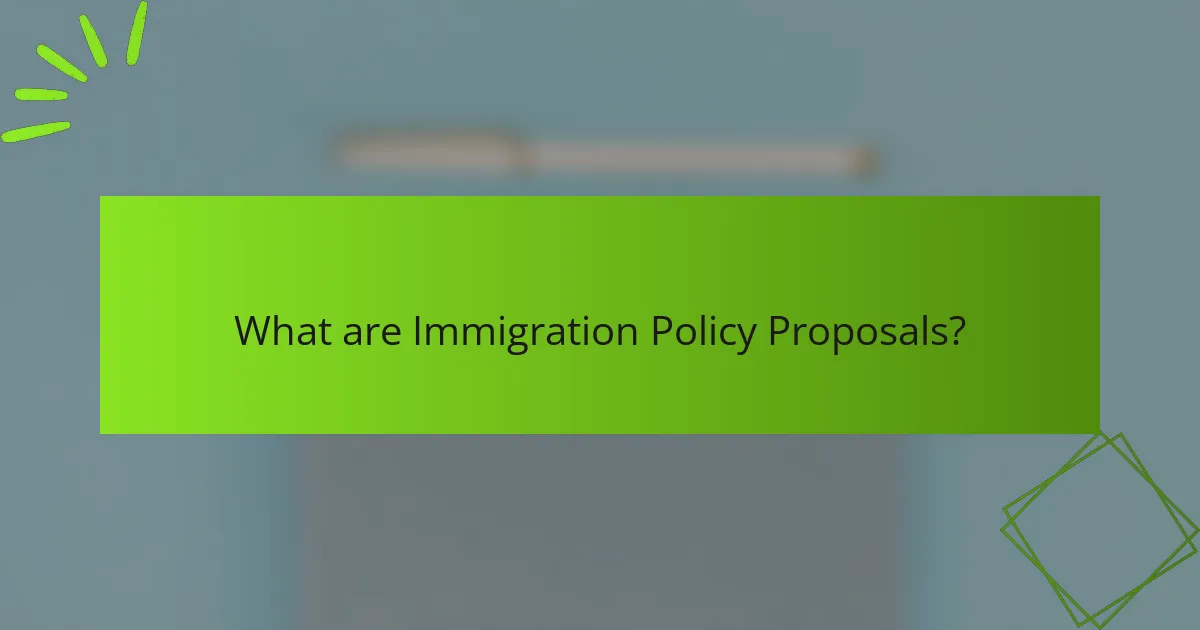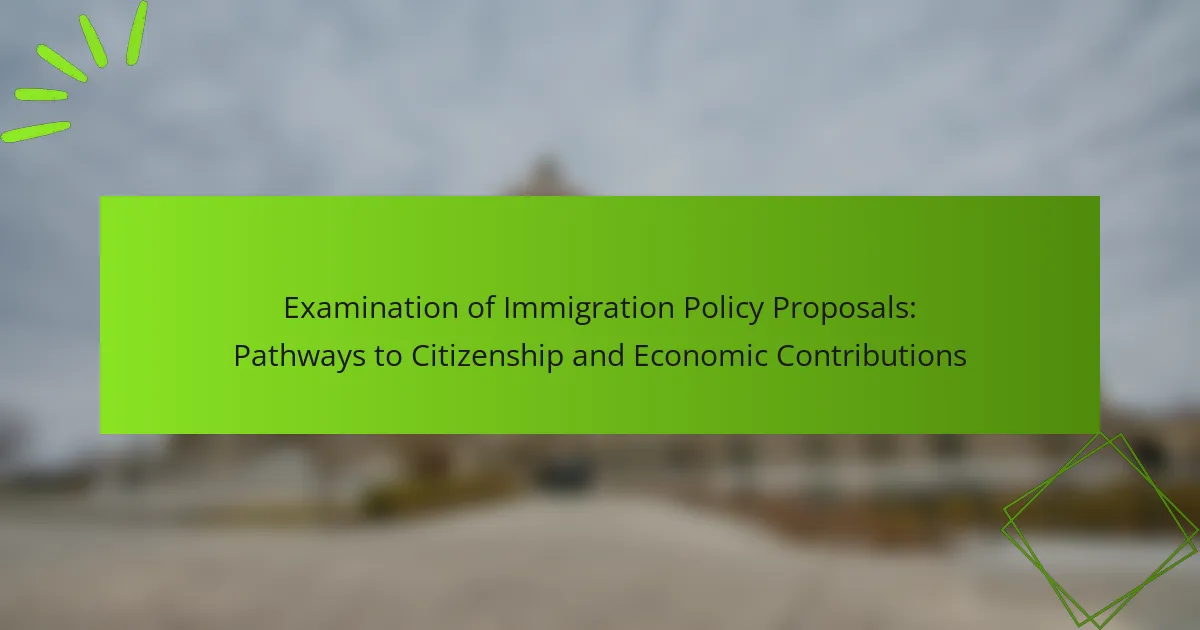Immigration policy proposals are formal suggestions aimed at altering or establishing immigration laws and regulations. This article examines various proposals that address pathways to citizenship, visa processes, and border security measures, highlighting their historical context and recent trends. It discusses the economic and social implications of these proposals, including their influence on labor force composition and community dynamics. The article also explores the challenges these proposals face, such as political polarization, legal complexities, and public perception, which can significantly affect their implementation and effectiveness. Understanding these factors is crucial for stakeholders to ensure that immigration policies align with national interests and values.

What are Immigration Policy Proposals?
Immigration policy proposals are formal suggestions aimed at changing or establishing immigration laws and regulations. These proposals often address issues such as pathways to citizenship, visa processes, and border security measures. They may include recommendations for reforming existing immigration systems to improve efficiency and fairness. Historical examples include the Immigration Reform and Control Act of 1986, which aimed to address undocumented immigration. Recent proposals focus on creating more inclusive pathways for immigrants to contribute to the economy. Such proposals are often influenced by economic needs, demographic changes, and humanitarian considerations. The effectiveness of these proposals can be evaluated through their impact on immigration patterns and economic contributions.
How do Immigration Policy Proposals impact pathways to citizenship?
Immigration policy proposals significantly impact pathways to citizenship by establishing eligibility criteria and procedural requirements. These proposals can expand or restrict access to citizenship based on factors like residency duration, employment status, and family connections. For instance, policies that prioritize skilled workers may create pathways for professionals but limit options for low-skilled laborers.
Historical data shows that the Immigration Reform and Control Act of 1986 provided a pathway to citizenship for millions of undocumented immigrants, highlighting how legislative changes can alter citizenship landscapes. Additionally, recent proposals that include provisions for expedited citizenship for certain groups can facilitate quicker integration into society. Conversely, restrictive policies may increase barriers, leading to prolonged uncertainty for many immigrants.
Thus, the direction of immigration policy directly shapes the accessibility and feasibility of citizenship for various populations.
What are the different types of pathways to citizenship in immigration policy proposals?
The different types of pathways to citizenship in immigration policy proposals include naturalization, family reunification, and employment-based pathways. Naturalization typically requires residency, language proficiency, and civic knowledge. Family reunification allows citizens and lawful permanent residents to sponsor relatives for citizenship. Employment-based pathways often prioritize skilled workers and may include sponsorship by employers. Each pathway has specific eligibility criteria and application processes. For instance, naturalization processes can take several years and require background checks. Family reunification statistics show that it constitutes a significant portion of immigration to the U.S. Employment-based pathways are designed to meet labor market needs.
How do these pathways vary across different countries?
Pathways to citizenship vary significantly across different countries. In the United States, pathways include family reunification and employment-based visas. In Canada, the Express Entry system prioritizes skilled workers and offers a points-based assessment. Australia also employs a points-based system, focusing on skills and qualifications. European countries often have diverse pathways, including asylum, family reunification, and labor migration. Each country’s policies reflect its economic needs and social values. For instance, Germany’s immigration policy emphasizes integration and labor market needs. In contrast, some countries have more restrictive policies, limiting pathways to citizenship for economic migrants. These variations impact the economic contributions of immigrants in each nation.
What economic contributions do immigrants make through these policies?
Immigrants contribute significantly to the economy through various policies. They enhance the labor market by filling essential job vacancies, particularly in sectors like agriculture, healthcare, and technology. Immigrants often bring diverse skills that complement the existing workforce. This diversity can lead to increased innovation and productivity in businesses.
Additionally, immigrants contribute to tax revenues, which support public services and infrastructure. According to the Institute on Taxation and Economic Policy, undocumented immigrants paid an estimated $11.74 billion in state and local taxes in 2017.
Moreover, immigrants stimulate economic growth by starting new businesses. The Kauffman Foundation found that immigrants are nearly twice as likely to start a business compared to native-born citizens. Overall, these contributions demonstrate the vital role immigrants play in strengthening the economy through various policies.
How do immigrants contribute to the labor market?
Immigrants contribute to the labor market by filling essential roles in various industries. They often take jobs in sectors with labor shortages, such as agriculture, construction, and healthcare. According to the American Immigration Council, immigrants make up 17% of the U.S. labor force. This demographic helps to drive economic growth by increasing productivity. Immigrants also contribute to innovation and entrepreneurship. A study by the National Bureau of Economic Research found that immigrants are more likely to start businesses than native-born citizens. Their diverse skill sets enhance workforce capabilities and foster competitiveness. Overall, immigrants play a crucial role in sustaining and expanding the labor market.
What is the impact of immigrant entrepreneurship on the economy?
Immigrant entrepreneurship positively impacts the economy by driving innovation and job creation. Immigrants are responsible for starting a significant number of new businesses. According to the Kauffman Foundation, immigrants founded 25% of all new businesses in the United States in 2018. These businesses contribute to economic growth through increased competition and diversity in the marketplace. Additionally, immigrant-owned businesses create millions of jobs for both immigrants and native-born citizens. A report by the New American Economy found that immigrant entrepreneurs generated over $1 trillion in sales and employed more than 4.7 million people in the U.S. alone. This entrepreneurial activity enhances local economies and fosters community development.

Why is examining Immigration Policy Proposals important?
Examining immigration policy proposals is important because they shape the legal framework for immigration. These proposals influence who can enter and remain in a country. They also impact the economy by determining the labor force’s composition. For example, studies show that immigrants contribute significantly to economic growth. According to the National Academies of Sciences, Engineering, and Medicine, immigrants boost innovation and entrepreneurship. Policies can also affect social integration and community dynamics. Understanding these proposals helps stakeholders make informed decisions. This ensures that immigration aligns with national interests and values.
What are the social implications of these proposals?
The social implications of immigration policy proposals include increased integration of immigrants into society. These proposals aim to provide pathways to citizenship, fostering a sense of belonging. Enhanced social cohesion can result from inclusive policies that allow immigrants to participate fully in community life.
Research shows that communities with higher immigrant populations often experience cultural enrichment. For instance, a study by the American Immigration Council indicates that immigrants contribute to cultural diversity and innovation.
Additionally, pathways to citizenship can lead to improved economic contributions. Immigrants with legal status are more likely to invest in their communities. This investment can result in job creation and increased local spending.
Overall, these proposals can promote social stability and economic growth by integrating immigrants into the fabric of society.
How do immigration policies affect community integration?
Immigration policies significantly impact community integration by shaping the legal and social frameworks that govern immigrant inclusion. Policies that promote pathways to citizenship tend to enhance integration by providing immigrants with rights and access to resources. For instance, the U.S. Citizenship and Immigration Services reports that naturalized citizens are more likely to participate in civic activities, such as voting and volunteering. Conversely, restrictive immigration policies can lead to social exclusion and marginalization of immigrant communities. Research by the Migration Policy Institute indicates that communities with welcoming policies experience higher levels of social cohesion and economic contributions from immigrants. Thus, the nature of immigration policies directly influences the degree of community integration.
What role do public perceptions play in shaping these proposals?
Public perceptions significantly influence the formulation of immigration policy proposals. These perceptions can shape political agendas and dictate the priorities of lawmakers. When the public views immigration positively, there is often greater support for pathways to citizenship. Conversely, negative perceptions can lead to stricter policies and resistance to reform. Research shows that public opinion can sway legislative outcomes, as seen in various immigration reform debates. For instance, surveys indicate that a majority of Americans support providing legal status to undocumented immigrants under certain conditions. This widespread support can lead to more inclusive proposals. Thus, public perceptions act as a driving force behind the acceptance and development of immigration policies.
How do these proposals influence national security and public policy?
Immigration policy proposals significantly influence national security and public policy by shaping the legal framework for citizenship and residency. These proposals can enhance national security by establishing clear vetting processes for immigrants. Improved vetting can reduce the risk of allowing individuals with harmful intentions into the country.
Moreover, pathways to citizenship can foster social cohesion and integration, which are vital for a stable society. When immigrants feel secure and valued, they are more likely to contribute positively to their communities. Economic contributions from immigrants can bolster public policy by increasing tax revenues and supporting local economies.
For instance, research shows that immigrants contribute over $2 trillion to the U.S. economy annually, which underscores their importance in public policy discussions. Thus, these proposals not only address immigration but also have broader implications for national security and economic stability.
What measures are taken to ensure security in immigration policies?
Security in immigration policies is ensured through a combination of background checks, biometric data collection, and information sharing among agencies. Background checks involve screening applicants against criminal databases and national security lists. Biometric data collection includes fingerprints and [censured] recognition to verify identities. Information sharing occurs between federal, state, and local agencies to track immigration status and criminal activity. Additionally, border security measures, such as surveillance technology and patrols, help prevent illegal crossings. These strategies are designed to enhance national security while managing immigration effectively.
How do policy proposals address illegal immigration?
Policy proposals address illegal immigration by suggesting pathways to legal status for undocumented immigrants. These proposals often include provisions for work permits and residency options. Many aim to prioritize family reunification and economic contributions. Some proposals suggest increased border security measures to prevent future illegal immigration. Others focus on providing resources for local communities to support integration. Studies indicate that comprehensive immigration reform can enhance economic growth. For instance, the Center for American Progress found that legalizing undocumented immigrants could boost GDP by $1.5 trillion over a decade.

What are the challenges associated with Immigration Policy Proposals?
Immigration policy proposals face several challenges. These include political polarization, which complicates consensus-building. Economic implications are often debated, affecting public opinion. Legal complexities arise from existing laws and international agreements. Implementation logistics pose practical difficulties for government agencies. Public perception can lead to resistance or support based on misinformation. Additionally, proposals may face scrutiny regarding their impact on social services. Data from the Migration Policy Institute indicates that these factors significantly influence policy outcomes.
What are the common criticisms of current immigration policies?
Common criticisms of current immigration policies include their lack of fairness and transparency. Many argue that these policies disproportionately affect marginalized communities. Critics point to lengthy application processes as barriers to legal status. The policies often create family separations, causing emotional and social distress. Additionally, there are concerns about the enforcement measures leading to racial profiling. Critics also highlight that current policies do not adequately address labor shortages in key industries. Furthermore, many argue that the policies fail to provide a clear pathway to citizenship for undocumented immigrants. These criticisms reflect a broader call for reform to create a more equitable immigration system.
How do economic arguments against immigration policies manifest?
Economic arguments against immigration policies manifest through concerns about job competition and wage suppression. Critics argue that an influx of immigrants can lead to increased competition for low-skilled jobs. This competition may result in lower wages for native workers. Studies indicate that areas with higher immigration rates often experience stagnant wage growth. Additionally, there are fears that immigrants may burden public services and welfare systems. Some argue that this can lead to increased taxes for citizens. These economic arguments frequently influence public opinion and policy decisions regarding immigration.
What ethical concerns arise from immigration policy proposals?
Ethical concerns arising from immigration policy proposals include issues of fairness, human rights, and social justice. These policies often create disparities in treatment among different groups. For instance, some proposals may prioritize skilled workers over refugees, raising questions about compassion and equity. Additionally, policies that lead to family separation can violate fundamental human rights. Research by the American Immigration Council highlights the psychological impact on families affected by such policies. Furthermore, enforcement measures can disproportionately target marginalized communities, leading to systemic discrimination. Overall, these ethical implications necessitate careful consideration in the formulation of immigration policies.
What best practices can improve Immigration Policy Proposals?
Best practices to improve immigration policy proposals include stakeholder engagement, data-driven decision-making, and clear pathways to citizenship. Engaging various stakeholders ensures diverse perspectives are considered. Data-driven decision-making utilizes accurate statistics to inform policies, enhancing their effectiveness. Clear pathways to citizenship provide transparency and motivate compliance. Research indicates that inclusive policies lead to better economic outcomes. For instance, a report by the National Academies of Sciences, Engineering, and Medicine found that well-structured immigration policies can significantly boost economic growth.
How can policymakers ensure equitable pathways to citizenship?
Policymakers can ensure equitable pathways to citizenship by implementing inclusive immigration policies. These policies should prioritize access for marginalized communities. They must simplify the application process to reduce barriers. Providing legal assistance can help applicants navigate complexities. Policymakers should also establish clear criteria that promote fairness. Data shows that inclusive policies can enhance economic contributions. For instance, a study by the National Academy of Sciences indicates that immigrants contribute significantly to the economy when integrated effectively.
What strategies can enhance the economic contributions of immigrants?
Enhancing the economic contributions of immigrants can be achieved through targeted policy strategies. Providing access to education and vocational training improves skills and employability. Streamlining the immigration process can reduce barriers to entry and encourage entrepreneurship. Supporting immigrant-owned businesses through grants and loans boosts local economies. Implementing mentorship programs connects immigrants with established professionals for guidance. Promoting community integration fosters social cohesion and encourages participation in the workforce. Research shows that immigrants contribute significantly to innovation and job creation, with studies indicating they start businesses at higher rates than native-born citizens.
Immigration policy proposals are formal suggestions aimed at changing immigration laws and regulations, focusing on pathways to citizenship, visa processes, and border security. These proposals significantly influence the accessibility of citizenship and economic contributions of immigrants, with various pathways such as naturalization and family reunification. The article examines the impact of these proposals on national security, community integration, and economic growth, as well as the challenges and criticisms faced in the current immigration system. It highlights the importance of equitable policies and best practices to enhance the contributions of immigrants to society and the economy.
